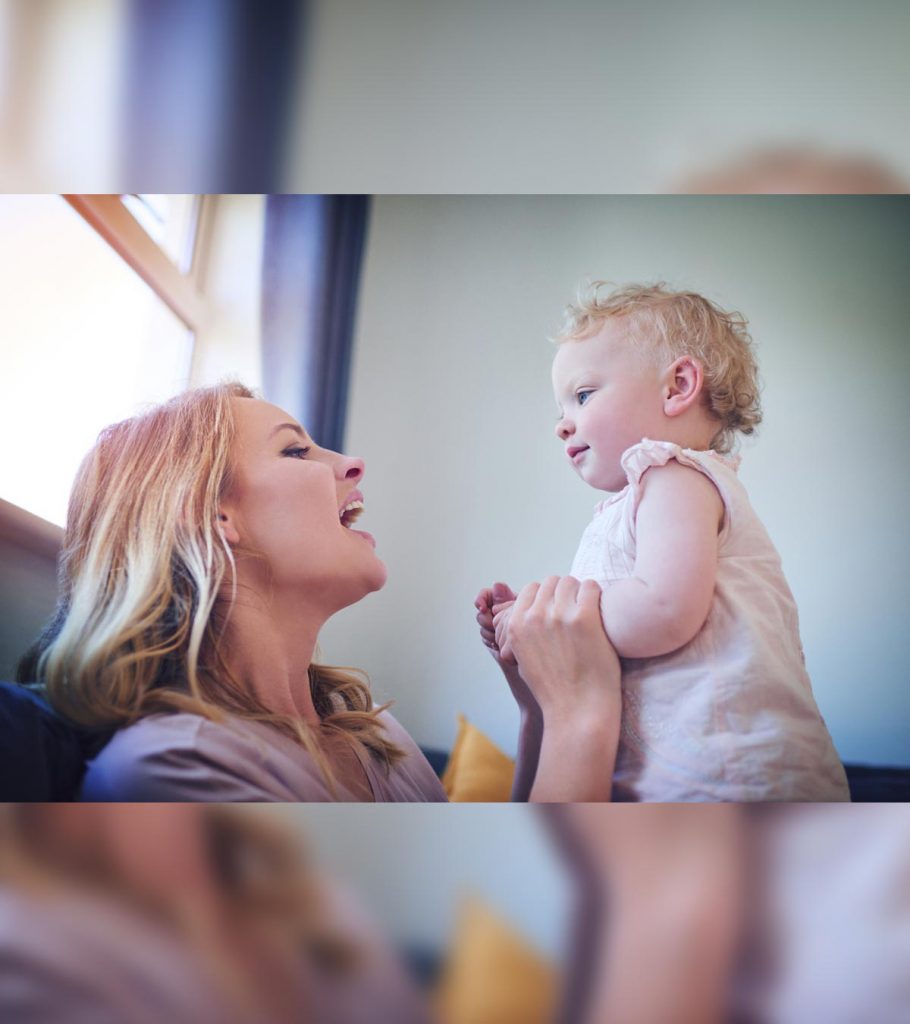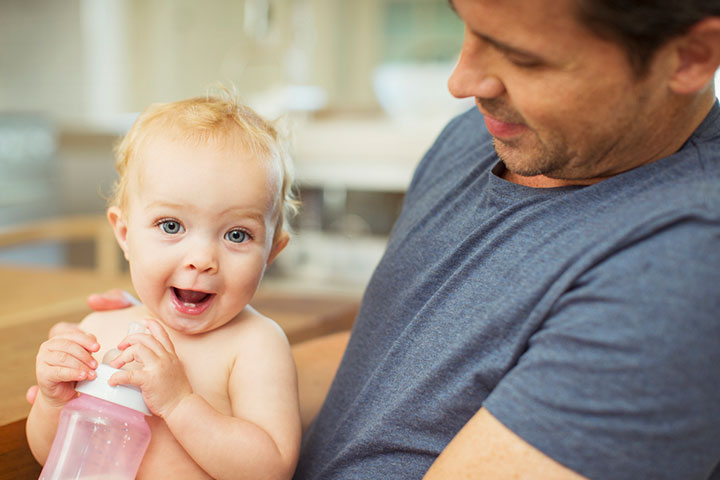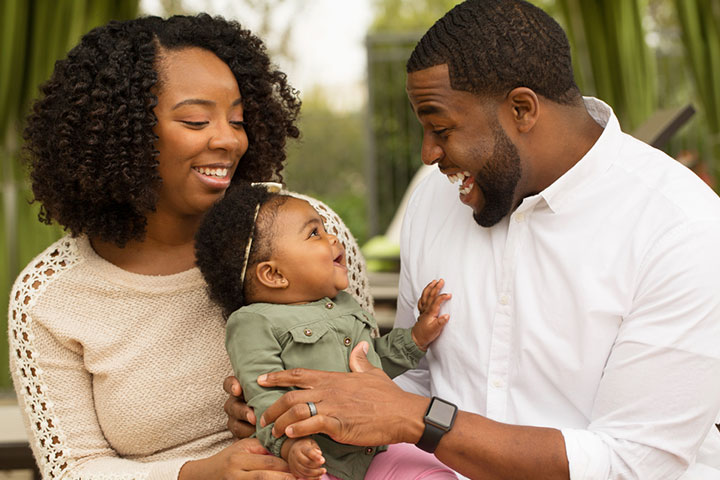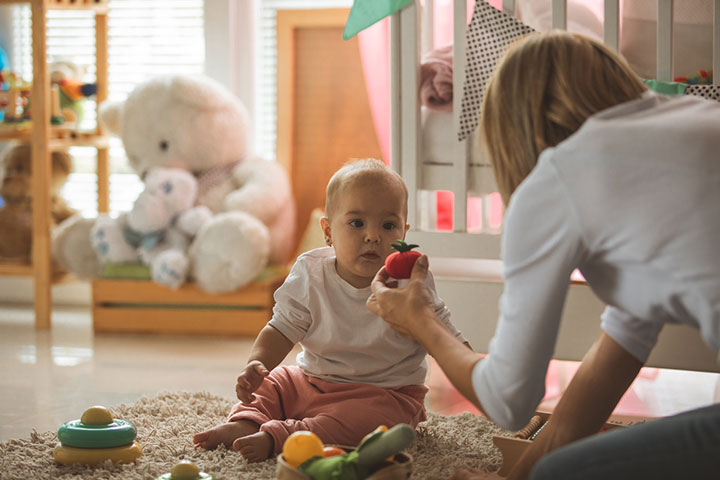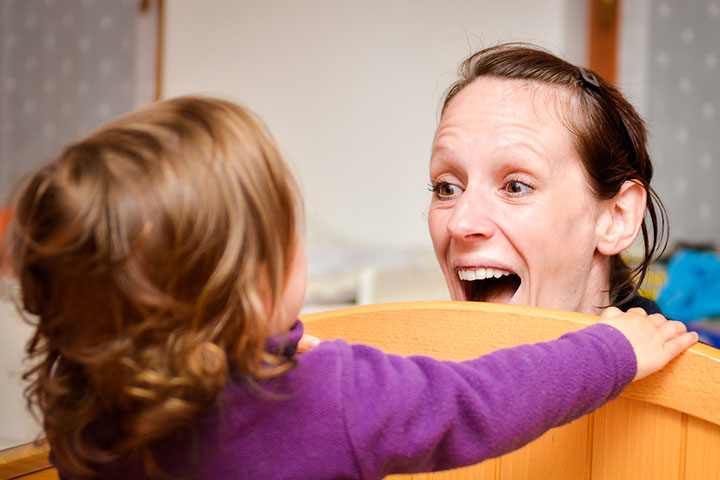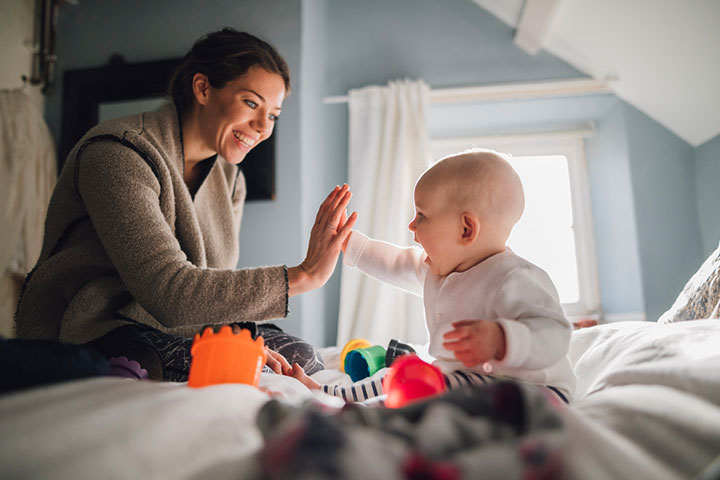Hearing the baby utter their first word is the most joyous moment in the parent’s life. Parents may also wonder when do babies say “mama” and “dada.” It is a milestone that most parents anticipate.
Learning to talk is a gradual process that starts with basic communication skills such as gurgling and cooing. Most babies can do the babbling by the time they are three months of age (1). However, every baby is unique and grows at its own pace. So, the timeline for when they would utter “mama” or ”dada” may differ.
Alina Barac, a mother and blogger, recounts the first time her daughter said the word ‘mama.’ She writes, “So here I am holding my baby’s legs up in the air waiting for her to poop while tears roll down her beautiful face… After few minutes that seemed like forever she finally done it and through those tears there she said the word I wanted to hear for such a long time. “Mama”. I couldn’t help myself so I picked her up risking another poop attack all over myself. Her tears stuck on my face and my baby sobbing in pain while I smile like an idiot happy that she called me mama for the first time ever. And this is our moment that we shared together and I will always remember. Just me and her and a big blob of smelly poop between us. Nothing like I ever imagined (i).”
Read to know when do babies say “mama” and “dada” and some tips to encourage your baby to say those adorable words.
At What Age Do Babies Say “Mama” And “Dada”?
The answer to your question when do babies start saying “mama” or “dada” is, usually by the age of nine months (2). It is the average age for achieving the milestone, and it does not mean all babies say those words at nine months. Some infants might be able to say it earlier, while some may take a few extra months to say those adorable words.
A mother of two and an anonymous blogger behind Mama Re-organized discusses the age around when her baby started saying the words mama and dada. In her blog titled ‘11 AND 12 MONTHS!,’ she says, “Curren (son) lights up when he sees me or John and says Mama and Dada all day long. He can also say outside, hi, bye, he can wave, he says Austin (father), he likes to point at things, and he signs for all done (ii).”
“Mama” Or “Dada”: Which Comes First?
There is no fixed trend or rule about whether the baby would say “Mama” or “Dada” first, although they may usually say “Mama” first. The “M” consonant sound is usually easier for a baby to say, and they might use the “Mmm” sound while gurgling by the age of six months (1). They may also say vowel sounds, such as “Ah” and “Eh.”
By the age of nine months, a baby learns to club the “Mmm” sound with the “Ah” vowel sound to make “Mama.” Some babies also club the “Ah” vowel sound with the “D” sound to say “Dada.”
As their speech skills improve and orofacial muscles become stronger, they become better at speaking various consonant sounds. Thus, most babies can say both “Mama” and “Dada” by the age of 12 months.
Do Babies Mean It When They Say “Mama” And “Dada”?
Most babies can understand the words’ meaning and correctly attribute “Mama” and “Dada” to the right parent by the age of 12 months or early (3). Some younger babies may understand the meaning of the words, that is, they learn that the words are used to refer to the primary caregivers — the parents. However, it is not uncommon for younger babies to use the words interchangeably to refer to a parent or anyone else.
As the baby’s cognitive development progresses, they become better at understanding nouns and could remember names. A one-year-old could even point towards the right object or person when it is named (4). Therefore, it is usually by the age of 12 months that babies say “Mama” and “Dada” with the correct understanding of its meaning (5).
Tips To Make Babies Say “Mama” And “Dada”
Each infant is different and may achieve the milestone at a slightly different age. Nevertheless, you may try various activities and exercises to help the baby achieve this speech milestone. Below are some methods to improve the baby’s language and communication skills, thus encouraging the baby to say “Mama” and “Dada” gradually (1).
- Teach the name of objects and people: One of the best ways to teach names and other proper nouns to your baby is by pointing at an object and naming it. While playing with the baby, point at a toy and say its name. When your pet walks by, refer to it by its name. As the baby grows older, you can use words to refer to a parent by saying sentences such as, “Where is Dada?” and “Look, it’s Mama.” The baby will learn to associate the sound with that person and gradually understand it is used to refer to that person.
- Read to the baby: Sit with your baby, enjoy a storytime session, lay a children’s book, and read it aloud. Make sure to point at various pictures and name them. The next time you read the same book, point at a picture and ask the baby to name it. This activity during bedtime or at a leisure time helps the baby learn and memorize the name of different items or objects, laying the foundation for using words, such as “Mama” and “Dada.”
- The “Mama” and “Dada” photo album: Make an album with the pictures of the mother and father. Sit with the baby and say “Mama” and “Dada” while pointing at the pictures. You can also encourage the baby by asking, “Who is it?” while pointing at a picture.
- Play peek-a-boo: It is one of the best games to improve a baby’s speech and language skills. Let the mother sit with the baby while the father hides behind the curtain. Prompt the baby by asking, “Who is that behind the curtain?”. Encourage the baby to answer it. You may ask questions, such as “Is it Dada?”. Let the father draw the curtain away and exclaim, “It is Dada!”. Play the peek-a-boo game regularly to improve the little one’s skills gradually.
- Sing songs and nursery rhymes: Nursery rhymes and songs help babies and toddlers practice their language skills. The musical nature of rhymes and songs could also make it easier for the toddler to memorize new words and understand their meanings. You may pick from a plethora of classic nursery rhymes or create your very own songs that include “Mama” and “Dada” in the lyrics.
- Have conversations: Babies begin to respond to sounds by making sounds by the age of six months. They may even respond to their name by eight to nine months (6). Use this achievement to teach words and nouns through conversations. Ask questions to your baby and wait until they respond. React to their response, even if it is coos and gurgles. When the baby notices responses, they are more likely to initiate conversations with their parents. Make a comfort zone for them so they come and talk to you.
- Praise achievements: Appreciate and praise your little one once they learn to use “Mama” and “Dada” correctly. Respond promptly and positively each time they call you “Mama” or when they refer to their father as “Dada.” Constant praise through words and cuddles is a great way to reinforce speech and language skills in babies. Hug them and be responsive to them when they speak up or try to use words.
Remember that each baby is different, and it is okay for a baby to achieve milestones at a different age than their peers. According to the US Centers for Disease Control and Prevention, consult a doctor if your baby does not say any single words by the age of 12 months (1). Depending on the underlying cause of speech delay, the doctor may refer you to a pediatric speech therapist.
It is common for parents to wonder when babies say mama and dada. It usually varies from one baby to another as each child’s development rate is different. However, you might expect them to utter their first words by the time they are about four months of age. You must keep having conversations with your baby and sing them songs or poems to help them understand words and motivate them to speak. But if your baby does not utter words or make sounds by the time they are about a year old, it is advised to consult a doctor or a speech therapist.
Key Pointers
- Babies usually start uttering words by the time they are three to four months old.
- The duration can vary from one baby to another, depending on their development.
- In most cases, babies usually say ‘Mama’ first!
Learn how to teach your child to say “Mama” or “Dada” with simple, fun activities! Our expert will show you how to use everyday objects to help your child learn to talk.
